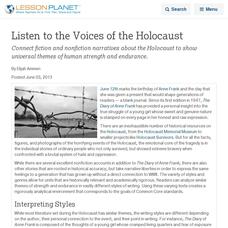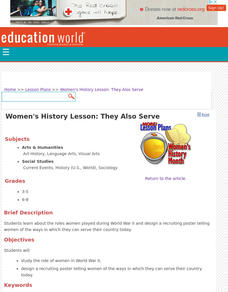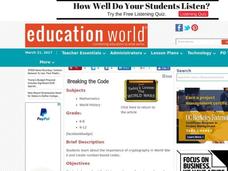Curated OER
Writing About Pearl Harbor
Students summarize the reasons why the U.S. entered World War 2. They view a video on the bombing of Pearl harbor, construct a timeline of WWII events, and evaluate propaganda posters to create their analysis of the start of U.S....
Core Knowledge Foundation
Volume 2 - A History of the United States: Modern Times—Late 1800s to the 2000s
The second volume of the Core Knowledge History of the United States ebook begins by asking young scholars to consider the impact immigration, industrialization, and urbanization had on the United States in the late 1800s. The text ends...
Echoes & Reflections
The Children and Legacies Beyond the Holocaust
Using video testimony, primary source documents that detail international agreements, and structured discussions, learners consider the precarious position of children during the Holocaust and other international conflicts, and how to...
Echoes & Reflections
Studying The Holocaust
While many young scholars are familiar with the Holocaust, they may not understand the specific history that led to the unprecedented atrocity. The first lesson in the unit helps teachers gauge their pupils' background knowledge. A...
Echoes & Reflections
The "Final Solution"
Nazi policies shifted from deportation and imprisonment to extermination of the Jewish people in death camps in the "Final Solution." Learners examine photos of artifacts, read poetry written by survivors, analyze testimony from...
Curated OER
Diaries And Memoirs
Young scholars analyze how personal diaries and memoirs record actual events. They compare and contrast diaries and memoirs from the Holocaust. They engage in journal or diary writing as a way to explore one's own feelings and self.
University of Southern California
Persecution of the German-Jews: The Early Years - 1933-1939
Young historians learn about the dehumanization process of stripping German Jews of basic, fundamental rights prior to the genocide of European Jews in the 1940s. Learners watch video clips of survivors who recount such events...
Curated OER
Listen to the Voices of the Holocaust
Connect fiction and nonfiction narratives about the Holocaust to show universal themes of human strength and endurance.
Carolina K-12
What Should President Truman Do?
After reading the article Choices: Truman, Hirohito, and the Atomic Bomb, class members engage in a simulation, assume the role of President Truman or one of his advisors and discuss the options open to the president. The exercise...
US Holocaust Museum
Deconstrucing the Familiar
Collaboration and complicity. Class members examine a series of photographs and consider how active participation and passive complicity represented in the photos contributed to the Holocaust.
Habits of Mind
Haileybury Habits of Mind Learning Resource Book
Imagine a learning community committed to using Costa and Kallick's Habits of Mind as the basis of curriculum design. The resource book is packed with lessons that are designed for and identify the standards and...
American Battle Monuments Commission
Entering Italy: The Naples-Foggia Campaign
The second half of 1943 found Allied soldiers struggling to separate Italy from the Axis Alliance and to solidify the new Italian government under Prime Minister Pietro Badoglio. High schoolers take a deeper look at the intricacies of...
PBS
Malcolm X: Minister and Civil Rights Activist
Any study of the leaders of the Civil Rights Movement would be incomplete without an examination of the life of Malcolm X. Class members view a short biographical video and analyze primary source documents to gain an understanding of the...
Echoes & Reflections
Timeline of the Holocaust
An interactive timeline uses images, videos, primary source documents, and links to informational text to chronicle the history of the Holocaust from 1933-1945.
Echoes & Reflections
The Ghettos
Young historians examine primary sources, including diaries, poems, and photographs, to consider the conditions in the ghettos and how they fit into the escalation of the Third Reich's plot against the Jewish people.
Echoes & Reflections
Rescuers and Non-Jewish Resistance
What does it mean to be a rescuer during the time of the Holocaust? Learners consider the role of those who resisted the Nazi invasions, including hiding Jewish people, throughout Europe. Activities include listening to the testimony of...
Echoes & Reflections
Jewish Resistance
Resistance to the Holocaust took on many forms. Learners explore the passive and active resistance of Jewish people who continued their practices and observances, as well as organized resistance against the evils of the Nazis. An...
Curated OER
They Also Serve
Young scholars explore the roles women played during World War II. They design a recruiting poster telling women of the ways in which they can serve their country today and present their posters to the class.
Curated OER
Reconstruction of Iraq: A Lesson of Historical Precedents
Students view a video clip about the reconstruction efforts in Iraq. They work together to compare and contrast the reconstruction plans after the Spanish-American War and World War II. They compare those results to the situation in Iraq.
Curated OER
Land of the Rising Guns?
Students discuss the decision after World War II of Japan's to follow a policy of pacifism. After reading an article, they identify the ways Japan is strengthening its military. They watch a video to discover how their Constitution was...
Curated OER
Farewell to Manzanar
Students investigate themes of justice and rights while reading the novel Farewell to Manzanar. They research contemporary civil rights issues and write reports. They also research the background of internment camps during World War II.
Curated OER
Tolerance in Times of Trial
Students view the treatment of people of Japanese and German descent during World War II. They explore the problems in assigning blame to populations during times of war. They identify modern examples of discrimination and stereotyping.
Curated OER
Breaking the Code
Learners understand what cryptography is and how to design original number-based codes. In this cryptography lesson, students research codes during World War II. Learners develop number-based codes.
Curated OER
Debating the Bomb
Students research how the development of the atomic bomb affected people in World War II, participate in a debate about the bomb's use, and investigate how it has affected people's lives since 1945.
Other popular searches
- Causes World War Ii
- World War Ii Map
- World War Ii Holocaust
- World War Ii Battles
- Post World War Ii
- Propaganda World War Ii
- Causes of World War Ii
- World War Ii Newspaper
- World War Ii Veterans
- Allies in World War Ii
- World War Ii Geography
- Post World War Ii Asia

























